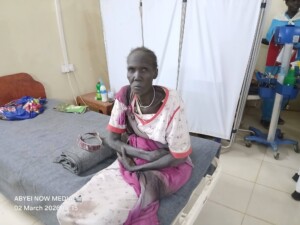Darfur sit-in against UNAMID withdrawal continues
The sit-in at Kalma camp near Nyala, South Darfur, entered its second week. The protestors demand that the joint United Nations-African Union Mission in Darfur (UNAMID) will not be withdrawn at the end of 2020. “Protection of the displaced can not be entrusted to those who killed them”, one of the sit-in leaders said.
 The sit-in in Kalma camp for the displaced last week (RD correspondent)
The sit-in in Kalma camp for the displaced last week (RD correspondent)
The sit-in at Kalma camp near Nyala, South Darfur, entered its second week. The protestors demand that the joint United Nations-African Union Mission in Darfur (UNAMID) will not be withdrawn at the end of 2020. “Protection of the displaced can not be entrusted to those who killed them”, one of the sit-in leaders said.
Protesters chanted slogans and delivered speeches in front of the UNAMID mission offices in Kalma camp. One of the leaders of the sit-in called the exit of UNAMID “a conspiracy against the displaced people, a humanitarian crime and a historic failure of the United Nations (UN)”.
He demanded that the mission remains until peace and security have been secured, criminals are being tried, the settlers on the lands of the displaced have been expelled, and the militias have been disarmed. He also demanded the restoration of hawakeer (lands traditionally used by a particular clan or tribal group), as well as individual and collective compensation for the displaced.
He called for pressure on the international community to keep UNAMID in Darfur. If the demands of the protestors are not met, he threatened with peaceful marches in all parts of the country.
Displaced people in Kabkabiya camp in North Darfur organised protests on Saturday as well, demanding that the UNAMID mission stay in Darfur.
UN mission
Sudan, the United Nations and the African Union agreed almost two months ago that the UN-AU mission in Darfur UNAMID will exit Sudan on December 31, as was planned before. The final decision was taken during the visit of African Union Commissioner for Peace and Security Smaїl Chergui and UN Under Secretary-General for Peacekeeping Operations Jean-Pierre Lacroix to Khartoum at the end of October.
A new UN Integrated Transition Assistance Mission in Sudan (UNITAMS) will be established at the beginning of 2021. It will not have a peacekeeping mandate, but will assist the government of Sudan to support the maintenance, monitoring, and building of peace. UNITAMS will be based on chapter VI of the United Nations Charter. UNAMID is based on Chapter VII, which allows the peacekeepers to use force in order to prevent violent conflict.
Rapid Support Forces
Last week, the Rapid Support Forces (RSF) stated that only Sudanese forces, consisting of the army, the RSF, the General Intelligence Service (GIS), and the police, will be responsible for protecting civilians after the withdrawal of the UNAMID peacekeeping force on December 31.
The Rapid Support Forces (RSF) government militia constitute an integral part of the Sudanese army, Commander-in-Chief of the Sudan Armed Forces (SAF) and chairman of the Sovereign Council, Lt Gen Abdelfattah El Burhan, asserted in December 2019. At the same time the RSF stays a force unto intself.
The Rapid Support Forces, that grew out of the janjaweed militias which fought for the Sudanese government in Darfur since the war broke out 2003, is widely believed to be responsible for atrocities in the region. The RSF were also strong supporters of the ousted President Omar Al Bashir. Tens of thousands of RSF troops joined the Saudi-led campaign against the Houthi rebels in Yemen since 2015. The RSF are also held responsible for the violent break-up of the Khartoum sit-in on June 3 last year.
The RSF militia has built up a vast business empire that captures not only a large part of the country’s gold industry, but has huge interests in many sectors of the Sudanese economy as well.
Radio Dabanga’s editorial independence means that we can continue to provide factual updates about political developments to Sudanese and international actors, educate people about how to avoid outbreaks of infectious diseases, and provide a window to the world for those in all corners of Sudan. Support Radio Dabanga for as little as €2.50, the equivalent of a cup of coffee.












 and then
and then